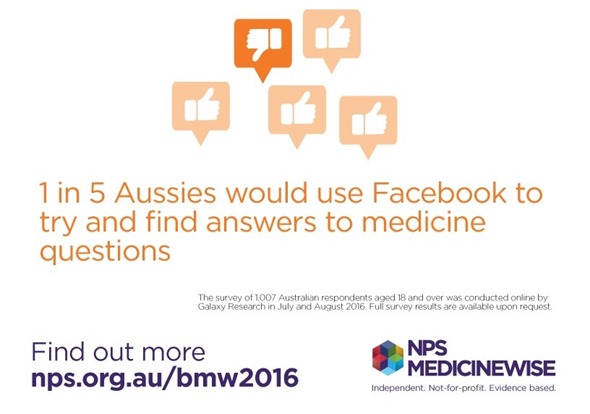At our recent NPS MedicineWise ‘National Medicines Symposium’, held in Canberra, Australia, we heard about a study of conversations among pregnant women and new mothers on Facebook.
The research was presented by pharmacists from the Calvary Public Hospital in Canberra, who looked at conversations that took place in selected parenting groups on Facebook. Of these 825 responses from 55 de-identified Facebook conversations, the majority of people were asking about treatment advice for acute conditions, and the most common medications asked about specifically by name were paracetamol and ibuprofen.

Were you surprised by these findings?
A medium like Facebook means you can connect with others in a similar situation at any time from the comfort of your home, but to me the research highlighted a need for health professionals to provide clear direction on where new parents and pregnant women can access reliable and evidence based information about medicines.
How accurate did the study find the online guidance to be?
The study authors found that 19% of responses to people's posts about medicines or health conditions in pregnancy or in their children were actually classified as inaccurate.
I’d certainly acknowledge that online groups can be a great place to find support, especially for new parents, but two per cent of the responses examined in the study were considered by the authors as potentially harmful if the person who had asked the original question went on to follow the advice offered by other parents.
Some examples of incorrect advice included responses that recommended too frequent administration of paracetamol or immunisation advice that was outside the recommended schedule. There were also a number of inappropriate medication suggestions for women who were pregnant and breastfeeding.
What's this medicine for?
How important is it to seek evidence-based information about medicines?
It’s very important to look for information about medicines that is not only evidence-based but also independent of vested interests.
Ideally, everyone would seek information from a health professional who knows about you, your medical history and conditions, and any other medicines you might be taking.
Especially if you are pregnant or planning to be, or caring for a child and would like to find out more about a particular medicine, talk to your health care team – your specialist, obstetrician, GP, midwife, nurse or pharmacist, and read the packaging, labels and information for your medicine (available on the NPS MedicineWise website or from your pharmacist or doctor).
What are the active ingredients?
Where are the best places to find evidence-based information about medicines online?
Of course, the health professionals that care for you are a reliable source of health information, but you may not always be able to talk to them.
For Australians, NPS MedicineWise, HealthDirect and Better Health Channel are good places to start when seeking medicines information online because they’re independent and credible websites designed to support you to find information on health conditions and medicines, and are free from commercial advertising or corporate sponsorship.
And in Australia, Consumer Medicines Information (CMI) leaflets are available for all prescription medicines and many non-prescription medicines. The leaflets explain how the medicine works, as well as giving practical advice on how and when to take it, common side effects and potential interactions with other medicines.
CMIs are available on websites like NPS MedicineWise or the Therapeutic Goods Administration (TGA), or you can ask your pharmacist to print it out for you.
How do I take my medicine correctly?
What more needs to be done to guide consumers on where they can find accurate and evidence-based information on medicines online?
Almost four out of five Australians (78%) report that they look for information about medicines on the internet, according to a 2016 survey* we released during Be Medicinewise Week earlier this year.
Three out of five people (58%) admitted they will sometimes or always look up information about health conditions on the internet to avoid going to see a health professional—with this number increasing to almost four in five people (79%) in the younger age category of 18-34 year olds.
But it’s important to be aware that not all health information you access on the internet will be accurate or reliable. Some might be full of medical jargon and not have plain language statements to explain the information clearly.
You need to be able to assess the reliability of information found on the internet, and understand limitations of what internet can tell you. As part of our work at NPS MedicineWise, we aim to assist people to work with their health professionals, such as a doctor, nurse or pharmacist, to better understand their health and any medicines, tests and treatments they might need.
What are the side effects and what can you do?
Can you please outline the main findings of another study also presented at the National Medicines Symposium in Canberra regarding knowledge of children’s paracetamol?
Another study presented at the National Medicines Symposium 2016 in Canberra indicated that many people don’t know basic information about children’s paracetamol.
This small study of 174 adults who had recent purchased children’s paracetamol, conducted by researchers at the University of Wollongong, found that approximately a quarter of the respondents (26.4%) did not know the recommended maximum daily dose for the medicine.
Over a third of people (37.4%) did not know that liver toxicity could result from overdose of children’s paracetamol, and almost half (46%) didn’t know how many days in a row the recommended dose could be safely given.
How important is it to know how to accurately measure and administer medicines such as paracetamol to children?
It’s important for people—particularly parents—to understand that all medicines come with risks as well as benefits.
Small mistakes can cause big problems in little bodies, so parents and carers need to know how to give medicines to children safely.
Knowing how to accurately measure and administer medicines to children will help to avoid accidental overdosing or underdosing.
What are the main tips to be “medicinewise” when administering over-the-counter (OTC) medicines to children?
Some ways to be medicinewise when children are involved include reading the medicine label and packaging, knowing the child’s weight, measuring liquid medicines accurately (by learning how to use the dosing device and checking the dose is right), keeping track of the medicines given, and asking questions if you’re ever unsure about anything.
If you’re ever unsure about what to do with regards to administering a medicine, where can you find help?
In addition to reading the medicine label and packaging and checking the Consumer Medicine Information (CMI) leaflet, you can speak to your doctor, pharmacist or other health professional for advice on administering medicine.
In Australia, for more information on prescription, over-the-counter and complementary medicines (herbal, ‘natural’, vitamins and minerals) from a health professional, including questions about side effects and medicine interactions, call NPS Medicines Line on 1300 MEDICINE (1300 633 424). Hours of operation are Monday–Friday 9am–5pm AEDT (excluding public holidays).
Where can readers find more information?
Our NPS MedicineWise website also has some good information about medicines and children, including tips for accurate dosing and a list of the top 5 medicinewise questions when measuring and giving a child’s dose of medicine. To find out more go to https://www.nps.org.au/
About Dr Andrew Boyden 
Dr Andrew Boyden is a general practitioner with additional qualification in public health. Prior to being appointed as medical adviser with NPS MedicineWise he worked in health advisory and management roles with both government and non-government organisations - including as national director of clinical issues for the National Heart Foundation of Australia and medical adviser with the Department of Health and Ageing. He has wide ranging interests in evidence- based healthcare, including in relation to the prevention and management of chronic disease, and the quality use of medicines and diagnostic tests.